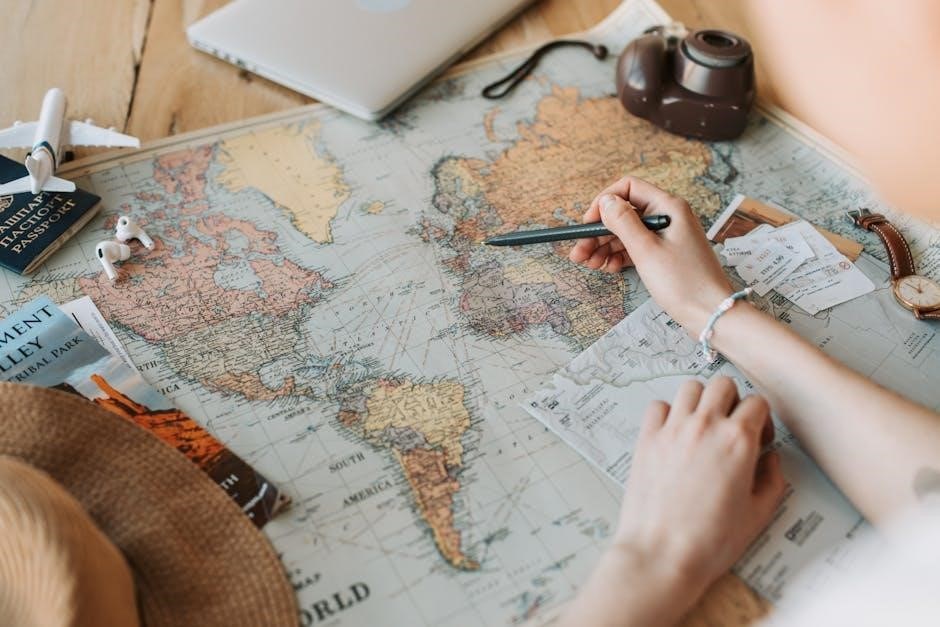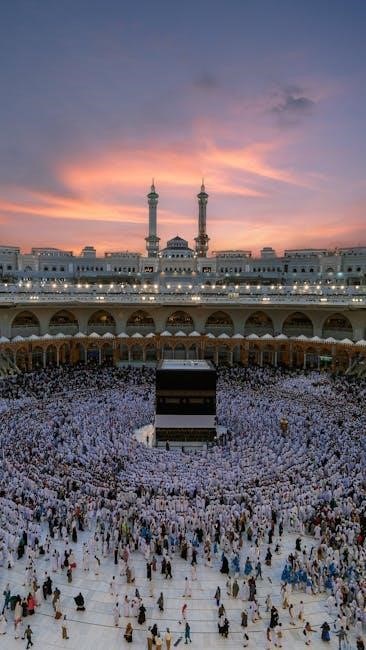
Umrah‚ the lesser pilgrimage‚ is a Sunnah revered for its spiritual significance. It involves Ihram‚ Tawaf around the Kaaba‚ and Sa’ee between Safa and Marwah‚ performed any time except during Hajj.
Definition and Significance of Umrah
Umrah‚ often referred to as the lesser pilgrimage‚ is a revered Islamic ritual that embodies deep spiritual significance. Unlike Hajj‚ it is not obligatory but highly recommended as a Sunnah. Umrah serves as an act of worship that strengthens one’s connection with Allah‚ offering a unique opportunity for forgiveness and spiritual renewal. It involves key rituals such as Ihram‚ Tawaf around the Kaaba‚ and Sa’ee between Safa and Marwah. Its performance is encouraged throughout the year‚ excluding the five days of Hajj‚ making it accessible to pilgrims globally.
Umrah as a Sunnah and Its Virtues
Umrah is a Sunnah rich in virtues‚ emphasizing its importance in Islamic worship. Performing Umrah consecutively with Hajj is praised for its ability to erase sins and alleviate poverty‚ as narrated by the Prophet (PBUH). It is also a means of seeking Allah’s forgiveness and earning His mercy. The Prophet (PBUH) encouraged Muslims to perform Umrah frequently‚ highlighting its spiritual and emotional benefits. By fulfilling this Sunnah‚ pilgrims draw closer to Allah‚ experiencing a profound sense of renewal and inner peace.
Preparation for Umrah
Preparing for Umrah involves spiritual and physical readiness‚ including Ghusl‚ trimming nails‚ donning Ihram attire‚ and arranging travel documents and accommodations in advance.
Spiritual Preparation
Spiritual preparation for Umrah involves purifying the heart and soul. Perform Ghusl and Wudhu before donning Ihram to symbolize cleanliness. Make a sincere intention to seek Allah’s pleasure‚ focusing on worship without worldly distractions. Seek forgiveness for past sins and engage in extra prayers and Quran recitation. Cultivate humility‚ patience‚ and gratitude‚ and avoid worldly attachments. Recite the Talbiyah with devotion‚ reflecting on its meaning and significance. This spiritual readiness is essential for a meaningful and accepted Umrah experience.
Physical and Material Preparation
Physical preparation for Umrah includes grooming and packing essentials. Trim nails‚ shave or trim hair‚ and ensure cleanliness. Pack light‚ comfortable clothing suitable for the climate. Include prayer mats‚ hygiene items‚ and a valid passport. Women should bring a scarf for modesty. Carry necessary medications and stay health-conscious. Budget wisely for expenses and plan accommodations. Mentally prepare for crowds and physical exertion during rituals like Tawaf and Sa’ee. Pack a small bag for essentials during rituals. Ensure all travel documents‚ including visas‚ are in order.
Travel Arrangements and Visa Requirements
Secure a valid passport and apply for an Umrah visa through authorized agents. Ensure all documents‚ including passport photos and travel insurance‚ are in order. Book flights and accommodations in advance‚ especially during peak seasons. Plan your itinerary‚ considering the distance between locations. Follow health guidelines and vaccinations recommended for travel to Saudi Arabia. Confirm visa requirements and processing times to avoid delays. Stay informed about entry regulations and COVID-19 protocols. Proper planning ensures a smooth journey and compliance with Saudi authorities.

The Rituals of Umrah
Umrah rituals include Ihram‚ Tawaf around the Kaaba‚ Sa’ee between Safa and Marwah‚ and trimming or shaving hair. These acts are performed with deep devotion and adherence to Islamic traditions‚ seeking spiritual purification and closeness to Allah.
Entering the State of Ihram
Entering Ihram is the first ritual of Umrah‚ marking the pilgrim’s commitment to the journey. It begins at designated Meeqat points‚ where men don two white‚ unsewn garments‚ while women wear modest attire. Before Ihram‚ pilgrims must perform Ghusl (bath) and Wudu (ablution)‚ trim nails‚ and remove unwanted hair. The state of Ihram is entered with a sincere intention‚ followed by the recitation of Talbiyah‚ a prayer expressing readiness to respond to Allah’s call. This act symbolizes humility‚ equality‚ and spiritual preparation for the sacred rites ahead.
Performing Tawaf (Circumambulation around the Kaaba)
Tawaf is a central ritual of Umrah‚ involving seven circuits around the Kaaba. It begins at the Black Stone‚ where pilgrims touch or gesture toward it while reciting Takbir. Each circuit is performed counterclockwise‚ with men often jogging during the first three rounds (Raml). Specific supplications‚ such as the one near the Yemeni Corner‚ are recommended. Pilgrims must maintain modesty‚ focus‚ and sincerity‚ reflecting on their connection to Allah. Tawaf symbolizes unity‚ devotion‚ and spiritual renewal‚ embodying the heart of the Umrah experience.
Performing Saee (Running between Safa and Marwah)
Saee is a fundamental ritual of Umrah‚ symbolizing Hajar’s search for water. It involves walking between the hills of Safa and Marwah seven times‚ starting at Safa. Pilgrims must ascend Safa‚ recite specific supplications‚ and then move briskly (for men) or walk normally (for women) to Marwah. Each lap includes reciting the Quran and making personal du’as. Sa’ee reflects trust in Allah’s provision and mirrors the trials faced by Hajar and Ismail‚ reinforcing themes of patience and divine mercy. This act culminates the Umrah rituals.
Shaving or Trimming the Hair
After completing Sa’ee‚ pilgrims conclude Umrah by shaving or trimming their hair. Men are recommended to shave‚ while women trim a small portion. This act signifies the end of Ihram and equality before Allah. It is a Sunnah‚ reflecting humility and the completion of spiritual purification. Shaving is preferred for men unless they plan to perform Hajj soon‚ in which case trimming is advised. This final step symbolizes liberation from worldly distractions and the fulfillment of Umrah rituals;

Detailed Guide to Ihram
Ihram is the sacred state pilgrims enter for Umrah‚ involving specific rituals and attire. Men wear two seamless white cloths‚ while women wear modest attire. Prohibited actions include cutting nails or hair‚ hunting‚ and marital relations. Pilgrims must maintain purity and focus on worship‚ avoiding worldly distractions. The state begins at designated Meeqat points and continues until completing Umrah‚ fostering a mindset of devotion and humility.
Where and When to Enter Ihram
Ihram must be entered at designated Meeqat points‚ such as Dhul Hulaifa‚ Jeddah‚ or Qarn Al-Manazil‚ depending on one’s direction to Makkah. Pilgrims should bathe‚ trim nails‚ and don Ihram attire before reaching these points. The time to enter Ihram is upon arriving at the Meeqat‚ with the intention to perform Umrah. Men must chant the Talbiyah loudly‚ while women softly‚ signaling the start of their sacred journey. This step is crucial for the validity of the pilgrimage‚ ensuring compliance with Islamic traditions. Proper preparation and awareness of these points are essential for pilgrims.
Prohibited Actions During Ihram
During Ihram‚ certain actions are forbidden to maintain its sanctity. Men must not cover their heads‚ while women should not veil their faces or wear gloves. Cutting hair‚ trimming nails‚ or removing any body hair is prohibited. Hunting‚ engaging in marital relations‚ and wearing perfumes are also disallowed. These restrictions ensure pilgrims focus on their spiritual journey. Adherence to these guidelines is essential for the validity of Umrah‚ reflecting deep respect for the sacred rituals. Awareness of these prohibitions helps pilgrims avoid unintentional mistakes.
Supplications During Ihram
During Ihram‚ specific supplications are recommended to enhance the spiritual experience. The Talbiyah‚ “Labbaik Allahumma Labbaik‚” is recited by men aloud and women softly‚ expressing readiness to respond to Allah’s call. Pilgrims are also encouraged to say‚ “Allahumma inni uridu’l-umrata‚ fa yassirha li wa taqabbalha minni‚” seeking ease and acceptance. Additionally‚ the dua upon entering the Holy Mosque‚ “Allahumma aftah li abwaba rahmatika‚” is recited to invoke divine mercy. These supplications strengthen the pilgrim’s connection with Allah and reflect the sacred nature of Ihram.
Tawaf and Its Etiquette
Tawaf involves circumambulating the Holy Kaaba seven times‚ facing it‚ and maintaining modesty. Pilgrims should avoid distractions‚ focus on supplications‚ and perform the ritual with sincerity and respect.
The Procedure of Tawaf
Tawaf begins with the intention to perform it‚ facing the Kaaba‚ and starting at the Black Stone. Pilgrims circumambulate the Kaaba seven times counterclockwise‚ maintaining modesty; Men may perform Ramal (brisk walking) in the first three circuits. After completing Tawaf‚ two rak’ahs of prayer behind Maqam Ibrahim are recommended. Supplications and reflections are encouraged during Tawaf to enhance its spiritual significance. The ritual concludes with drinking Zamzam water and invoking blessings. Proper etiquette includes avoiding distractions and maintaining focus on worship.
Duas and Supplications During Tawaf
During Tawaf‚ supplications are a key aspect of worship‚ enhancing the spiritual experience. Commonly recited duas include Rabbana Atina Fid Dunya Hasanh… and Subhanallah‚ Alhamdulillah‚ Allahu Akbar. Pilgrims are encouraged to invoke blessings‚ seek forgiveness‚ and make heartfelt prayers. Specific supplications are recommended at the Black Stone and Yemeni Corner‚ emphasizing humility and devotion. Personal supplications in any language are also valued‚ reflecting individual needs and aspirations. Sincerity and focus on Allah are paramount during this sacred ritual.
Common Mistakes to Avoid During Tawaf
During Tawaf‚ pilgrims must avoid several common errors to ensure the ritual’s validity. These include not maintaining modesty‚ rushing through the circuits‚ and failing to face the Kaaba. Additionally‚ some mistakenly believe the Tawaf is complete before finishing all seven rounds or neglect to keep their eyes lowered in humility. Others may talk excessively or lose focus‚ diminishing the spiritual impact. Cutting through the rows or failing to stay within the Tawaf area is also a frequent mistake. Awareness of these pitfalls ensures a more sincere and correct performance.
Saee and Its Significance
Saee‚ an essential ritual between Safa and Marwah‚ commemorates Hajar’s search for water‚ symbolizing perseverance. It enhances Umrah’s spiritual depth‚ fostering humility and faith.
The Historical Background of Saee
Saee holds profound historical significance‚ tracing back to Hajar’s desperate search for water. After being separated from Prophet Ibrahim‚ Hajar ran between Safa and Marwah‚ seeking divine intervention. This act of perseverance is commemorated during Umrah‚ where pilgrims reenact her journey. The ritual symbolizes trust in Allah’s providence and reflects the enduring lessons of faith and resilience. It is a poignant reminder of divine mercy and the rewards of unwavering belief.
Step-by-Step Guide to Performing Saee
Begin at Safa‚ facing the Kaaba‚ and recite supplications. Start with a brisk walk or light run to the first green marker. Walk between the two green markers at a normal pace. Repeat this seven times‚ ending at Marwah. Men are encouraged to run between the markers‚ while women should maintain a dignified pace. Recite the Quran‚ dhikr‚ or personal prayers throughout. After reaching Marwah‚ complete the ritual by trimming or shaving hair‚ signaling the end of Ihram. This act reflects Hajar’s trust in Allah and embodies spiritual devotion.
Duas to Recite During Saee
During Saee‚ recite the recommended du’a: “Rabb ighfir warham wa anta khayrur rahimeen” (O Lord‚ forgive and have mercy‚ for You are the Best of the merciful). Additionally‚ supplicate with “Subhanallah”‚ “Alhamdulillah”‚ and “Allahu Akbar” as you move between Safa and Marwah. These prayers reflect Hajar’s trust in Allah and enhance the spiritual experience. Reciting personal supplications and Quranic verses is also encouraged‚ emphasizing humility and gratitude;
Additional Recommended Acts
Visiting holy sites in Makkah and Madinah‚ such as Jabal Rahmah and Masjid Quba‚ is highly recommended. Recite Talbiyah and Durood frequently‚ and stay spiritually mindful.
Visiting the Holy Sites in Makkah
Visiting the holy sites in Makkah is a cherished act for pilgrims. Key sites include the Kaaba‚ Hira Cave‚ Arafat‚ and Jabal Rahmah. Pilgrims often pray at these locations‚ seeking divine blessings. Reciting specific supplications‚ such as the Talbiyah‚ is recommended. These visits deepen spiritual connection and provide an opportunity for reflection. Many pilgrims also perform additional prayers near these sites‚ especially during non-peak hours. Visiting these sacred places is a way to honor Islamic history and enhance the Umrah experience.
Visiting the Holy Sites in Madinah
Visiting Madinah’s holy sites is a deeply spiritual experience. Al-Masjid an-Nabawi‚ the Prophet Muhammad’s (PBUH) mosque‚ is the most revered site. Pilgrims also visit Jannat al-Baqi‚ where many companions are buried. Other significant sites include Masjid al-Quba and the Mount Uhud martyrs’ cemetery. Reciting specific prayers at these locations is recommended. Pilgrims are encouraged to maintain dignity and tranquility while exploring these sacred places‚ reflecting on Islamic history and the life of the Prophet (PBUH). These visits enrich the Umrah journey with spiritual and historical insights.
Recommended Supplications and Prayers
During Umrah‚ reciting specific supplications enhances the spiritual experience. The Talbiyah is recited upon entering Ihram‚ while the Tawaf and Sa’ee have their own designated prayers. Pilgrims are encouraged to invoke blessings upon the Prophet Muhammad (PBUH) during their visit to Al-Masjid an-Nabawi. General supplications for forgiveness‚ guidance‚ and acceptance of the pilgrimage are also recommended. Using authentic Islamic resources or apps can help pilgrims recite these prayers correctly and with sincerity‚ ensuring a meaningful and blessed Umrah experience.
Duas and Supplications for Umrah
Duas and supplications are vital for a blessed Umrah. Recite Talbiyah upon entering Ihram‚ specific prayers during Tawaf‚ and supplications for acceptance and forgiveness.
Duas for Entering and Exiting the Holy Cities
When entering Makkah or Madinah‚ recite specific supplications to express humility and gratitude. Upon entering Makkah‚ say: “Allahumma harama ‘alayka rafathi kaffil akuffi” (O Allah‚ make this journey a means of protection for me). Exiting requires gratitude‚ such as “Allahumma ashhadu ‘alayka bin naqdin wa tajawuzin” (I testify to Your favors and blessings). These supplications enhance the spiritual experience and seek divine acceptance.
Duas for Tawaf and Saee
During Tawaf‚ recite the Quran and supplications like “Allahumma innee as-aluka ilman nafi’an wa amalan mutaqabbalan wa isaban li-janabi-k” (O Allah‚ grant me beneficial knowledge‚ accepted deeds‚ and closeness to You). For Saee‚ recite “Inn as-Safa wal-Marwah min sha’airillah” (Verily‚ Safa and Marwah are among the symbols of Allah). These supplications enhance the spiritual connection and seek divine mercy during these sacred rituals.
General Supplications for Acceptance
During Umrah‚ supplicate with sincerity‚ seeking Allah’s acceptance and forgiveness. Recite “Allahumma ighfir li‚ warhamni‚ wahuqqiq urfidatili ilayk” (O Allah‚ forgive me‚ have mercy on me‚ and fulfill my hope in You). Also‚ invoke “Rabb ighfir warham wa anta khayrur rahimeen” (Lord‚ forgive and have mercy‚ for You are the best of the merciful). These supplications emphasize devotion‚ humility‚ and the desire for Allah’s blessings and acceptance throughout the pilgrimage journey.

Etiquette and Manners During Umrah
Respect the sanctity of holy sites‚ maintain modesty‚ and avoid loud conversations. Men and women should adhere to Islamic dress codes and avoid unnecessary mingling to uphold dignity and devotion.
Respecting the Sanctity of the Holy Places
Pilgrims must maintain the dignity of Masjid Al-Haram and the Kaaba by removing shoes before entering sacred areas. Avoid littering‚ respect prayer areas‚ and refrain from loud conversations. Keep the surroundings clean and adhere to rules set by authorities to preserve the holiness of the sites. Ensure all actions reflect reverence and devotion‚ upholding the spiritual ambiance for fellow worshippers.
Etiquette in the Masjid Al-Haram
Etiquette in Masjid Al-Haram requires maintaining silence‚ removing shoes before entering‚ and avoiding distractions. Women must wear appropriate hijab‚ and men should dress modestly. Respect prayer rows‚ avoid blocking pathways‚ and refrain from using phones loudly. Keep the mosque clean and follow all guidelines set by authorities. Ensure your actions reflect reverence‚ allowing others to worship without disturbance. Adhere to these practices to uphold the sacredness of the holy site.
Behavioral Guidelines for Men and Women
Men and women must adhere to modesty during Umrah. Men should wear two plain‚ unsewn white cloths (Ihram)‚ avoid covering the head or face‚ and ensure their shoulders are uncovered during Tawaf. Women must cover their hair but should not veil their faces or hands. Both genders must avoid physical contact and maintain segregation. Strictly follow Islamic dress code and behavioral norms to comply with the sanctity of the pilgrimage. These guidelines ensure a focused and spiritually enriching experience for all pilgrims.

Common Mistakes to Avoid During Umrah
Common mistakes include improper Ihram attire‚ uncovering the face incorrectly‚ and neglecting essential rituals. Avoid these errors to ensure a valid and spiritually fulfilling pilgrimage.
Mistakes Related to Ihram
Common mistakes include neglecting Ghusl or Wudu before donning Ihram‚ wearing inappropriate attire‚ and failing to recite the Talbiyah correctly. Men must avoid covering their heads or faces‚ while women should not veil their faces during Ihram. Additionally‚ some pilgrims forget to trim their nails or remove unwanted hair before entering the sacred state. Ensuring these steps are correctly followed is crucial for a valid and spiritually enriching Umrah experience.
Mistakes During Tawaf and Saee
Common errors include not starting Tawaf from the Black Stone‚ improper gestures like kissing the Stone without making dua‚ and failing to complete all seven circuits. During Saee‚ some pilgrims skip the required seven rounds or do not maintain the correct intent. Others forget to recite recommended duas or rush through the rituals without focus. Avoiding these mistakes ensures the validity and spiritual value of Tawaf and Saee‚ essential components of Umrah.
General Pitfalls to Watch Out For
Pilgrims often overlook proper Ihram protocols‚ such as incorrect attire or untimely entry points. Many neglect essential preparations like spiritual cleansing or financial planning. Others underestimate health risks‚ failing to stay hydrated or protect against crowds. Time management is another issue‚ with some rushing through rituals or missing critical steps. Being unaware of visa requirements and travel restrictions can also lead to complications. Avoiding these pitfalls ensures a smooth and spiritually fulfilling Umrah experience.

Health and Safety Tips
Pilgrims should stay hydrated‚ wear comfortable shoes‚ and carry essential medications. Avoid overcrowded areas and maintain personal hygiene to prevent illnesses. Stay informed about safety guidelines.
Staying Healthy During Umrah
Ensuring good health is crucial for a fruitful Umrah experience. Pilgrims should maintain a balanced diet‚ stay hydrated‚ and get adequate rest. It’s advisable to carry medications for common ailments like fever or indigestion. Avoid consuming untreated water and unhygienic food to prevent stomach infections. Wearing comfortable footwear is essential due to extensive walking. Additionally‚ carrying hand sanitizers and masks can help prevent the spread of contagious diseases. Regular health check-ups before the trip are also recommended to address any pre-existing conditions.
Safety Precautions in Crowded Areas
Safety in crowded areas during Umrah is paramount. Always stay alert and keep valuables secure‚ especially in densely populated spots like the Masjid Al-Haram. Use a waist pouch for important documents and cash‚ and avoid carrying large amounts of money. Stay close to your group and designate a meeting point in case of separation. Be cautious of pickpocketing and avoid displaying expensive items. Keep emergency contact numbers handy and ensure your phone is fully charged. Follow local guidelines and remain patient to ensure a safe and blessed experience.
Financial and Practical Tips
Plan a realistic budget‚ prioritize essential expenses‚ and avoid unnecessary spending. Carry local currency for small purchases and keep emergency funds separate for unexpected needs.
Budgeting for Umrah
Budgeting for Umrah requires careful planning to cover expenses like travel‚ accommodation‚ and visa fees. Allocate funds for Ihram clothing‚ essential items‚ and meals. Consider setting aside a contingency fund for emergencies. Research affordable packages and compare prices to maximize savings. Prioritize spending on necessary items like prayer mats‚ dua books‚ and toiletries. Avoid unnecessary purchases and plan according to your financial capacity to ensure a smooth and stress-free pilgrimage experience.
Essential Items to Carry
Pack light but wisely for Umrah. Include Ihram garments‚ a prayer mat‚ and a small Quran or dua book. Carry toiletries like toothbrush‚ toothpaste‚ and shampoo. Comfortable footwear is crucial for Tawaf and Sa’ee. Bring a reusable water bottle and snacks for energy. Include essential medications and a first-aid kit. A small backpack can hold valuables like passport‚ visa‚ and tickets. Ensure all items comply with airline and Saudi regulations for a smooth journey;
Umrah is a transformative experience‚ fostering spiritual growth and closeness to Allah. Follow this guide for a blessed journey‚ and pray for acceptance and safe return.
Final Advice for a Blessed Umrah
Conclude your Umrah with sincerity‚ seeking Allah’s forgiveness and guidance. Remain patient and grateful throughout your journey. Recite heartfelt duas‚ reflecting on the spiritual renewal. Ensure all rituals are performed with precision and devotion. Upon completion‚ supplicate for acceptance and a safe return. Carry the lessons of Umrah into daily life‚ striving to maintain a strong connection with Allah. May your Umrah be a source of blessings and transformation.
Prayers for Acceptance and Return
Conclude your Umrah with heartfelt prayers for acceptance and a safe return. Recite the dua: “Labbaik Allahumma Labbaik‚ La shareeka laka‚ Labbaik.” Express gratitude for the opportunity and seek forgiveness. Pray for the acceptance of your Umrah and for Allah’s guidance in your life. Supplicate for a safe journey home and the ability to return to the holy sites again. Remember to invoke blessings upon the Prophet Muhammad (peace be upon him) and seek a virtuous end to your pilgrimage.